In this week’s eSkeptic:
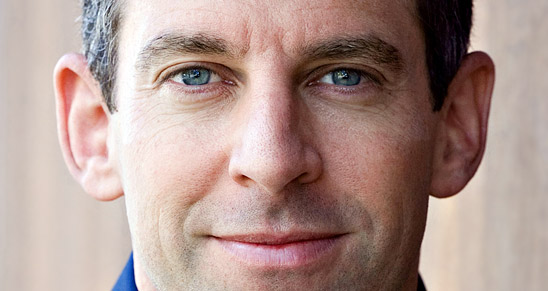
Sam Harris to Speak about
Free Will for Skeptics at Caltech
2:00 PM SUNDAY MARCH 25
Beckman Auditorium, Caltech
Download Map
The Skeptics Society is pleased to add Sam Harris as a bonus to its Spring 2012 Distinguished Science Lecture Series at Caltech. Dr. Harris will speak on the topic of Free Will, the title of his new book, which he will be signing immediately after the lecture.
The Skeptics Society already has a debate scheduled that date: “Has Science Refuted Religion?” featuring Caltech cosmologist Sean Carroll and Skeptic publisher Michael Shermer v. MIT physicist Ian Hutchinson and Christian apologist Dinesh D’Souza
ORDER TICKETS
This lecture is
SOLD OUT.
Please call between 12:00 and 5:00 pm Monday through Friday. The Caltech ticket office asks that you do not leave a message.
Order your tickets right away at the Caltech Public Events office as this event will sell out! The price of admission for both events remains the same: $10 Skeptics Society members/ Caltech/JPL community; and $15 for everyone else.
Sam Harris is the author of the New York Times bestsellers, The Moral Landscape, The End of Faith and Letter to a Christian Nation. His new book is short (96 pages), to the point, and will change the way we all view free will, as Oliver Sacks wrote: “Brilliant and witty—and never less than incisive—Free Will shows that Sam Harris can say more in 13,000 words than most people do in 100,000.” UCSD neuroscientist V.S. Ramachandran notes: “In this elegant and provocative book, Sam Harris demonstrates—with great intellectual ferocity and panache—that free will is an inherently flawed and incoherent concept, even in subjective terms. If he is right, the book will radically change the way we view ourselves as human beings.”
Don’t miss this spectacular day of disputation and debate!
Sum Ergo Cogito—
I Am Therefore I Think.
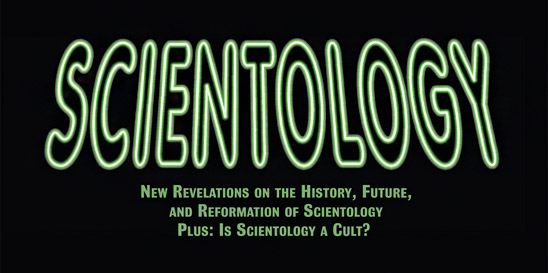
Skeptic Magazine 17.1: SCIENTOLOGY
Order a subscription to Skeptic magazine and get the Scientology issue as your first issue! Topics in this issue include:

- Is Scientology a Cult?
- New Revelations on the History, Future, and Reformation of Scientology
- 9/11 Controlled Demolition
Conspiracy Debunked - Can Science Deliver Eternal Life?
- Was the Resurrection a Grief Hallucination?
- Body Language Baloney?
- The Secret Behind
Outstanding Teaching - A Biologist on the Meaning of Life…
- Is Psychology a Science?
- Do J. K. Rowling’s Novels
Undermine Religion? - a special section on life after death
- Junior Skeptic: Fossil Fakes Part 2
- book review of Steven Pinker’s The Better Angels of Our Nature
- book review of Richard Horne’s A is for Armageddon: A Catalogue of Disasters That May Culminate in the End of the World As We Know It
- plus more…
Current subscribers should receive this issue by mid-February 2012. This will be available for purchase as a single back issue in a couple weeks.
ÉPOCA Magazine Interviews Michael Shermer
In this week’s eSkeptic, we present Peter Moon’s interview with Michael Shermer on why people believe weird things. This interview first appeared in Portuguese in the magazine ÉPOCA on January 16, 2012. Thank you to Michael Silva for translating the interview.
People Like to be Fooled
interview by Peter Moon
translation by Michael Silva
The psychologist and American writer, Michael Shermer, says that it’s easier to believe in weird things—like mediumship, horoscopes and flying saucers—than to think and question. The difference between a magician and a medium is that the magician confesses that he uses tricks, while the paranormalist says he has powers that enable him to read minds, predict the future or talk with the dead. “All a medium must say is that he has powers and people will believe him. It is part of human nature”, says the psychologist and American writer Michael Shermer, 57 years old, director of the Skeptic Society and Skeptic Magazine. “We didn’t evolve to doubt or have a skeptical view. This requires education and reflection. Believing is easier.” In this interview, he talks about the themes in his book Why People Believe Weird Things and attacks the farce behind the belief in flying saucers, witches, chiromancy and mediumship.
ÉPOCA: Why do people believe in weird things?
Michael Shermer: The basic reason lies in our brain, programmed by evolution to see our environment in a certain way and find supernatural reasons to explain natural events.
ÉPOCA: Please give an example.
Shermer: In tribal societies, the witchdoctor is the person who has the knowledge that can save the members of the tribe in decisive moments. The witchdoctors are the ones who know which plants and roots have special curative powers. It is they who decree that a certain region is taboo, making it into a prohibited zone and giving the fauna time to regenerate. Years later, in a moment of shortage, it is the witchdoctor that has the power to send the hunters to the location, saving the tribe from hunger. That kind of power was always exclusive of magicians, witchdoctors and priests. Therefore, believing in your emissaries meant one’s own salvation. When the witchdoctor said that he could see the future, that the members of the tribe should hunt or collect water in a certain region and that the salvation of everyone depended on doing what he said, everything he said was nothing more than a self-fulfilling prophecy. It’s as simple as that.
ÉPOCA: There are those who say they can see supernatural things and others who say they can hear angels singing and dead souls mourning.
Card reading is acting, which requires talent and practice. It doesn’t matter what the reader says, what matters is that it sounds convincing.
Shermer: We are social animals and the brain was programmed to recognize faces and facial expressions. Therefore, we have a tendency to see faces hidden in the clouds, in spots on a shroud or on rocks on the surface of Mars. For the same reason, all we have to do is look at clouds to recognize the forms of various animals. This is also an evolutionary inheritance since for millennia the ability to recognize the existence of an animal hidden in the landscape could mean the difference between life and death. Any person can say that he speaks with the dead. It’s nothing special. The hard part is getting the dead to answer. Claims such as these that were seriously investigated ended up revealing the existence of microphones hidden in furniture, in walls or in the oven. No photograph allegedly taken of a flying saucer survived a detailed examination. They are all false allegations, concoctions created to elude. Although it is possible that some claims of paranormal, UFOlogical, or psychic events might turn out to be true, but the truth is that so far all of them are false and probably most of them are nothing more than pure farse.
ÉPOCA: Why do women seem to believe more in weird things than men?
Shermer: That isn’t true. Men and women, indistinctly, have the same tendency to believe those things. What changes is the type of weird thing. Women believe more in mediums, spiritualists, fortunetellers, witchcraft, amulets, alternative medicine and healers. Men prefer to believe in the paranormal, pseudoscience, creationism and UFOs.
ÉPOCA: Why do people differentiate a professional magician who does magic tricks from a medium that says he’s using the paranormal?
Shermer: Because the magician confesses that he does a trick, but doesn’t reveal the secret. This has historical reasons. Magic is as old as the art of predicting the future. Many centuries ago, during the Inquisition, the magicians who earned a living following the regional fairs in medieval Europe were sensible to declare that they weren’t witches. They confessed that they used tricks so as not to end up in a bonfire. Their confessions withdrew from professional magicians a supernatural aura that they have never, to this day, been able to get back.
ÉPOCA: How about fortunetellers?
Shermer: Most of them ended up in a bonfire. Fortunetellers and mediums today were persecuted because they alleged having supernatural powers. They claimed to predict the future and influence people’s destinies. Now, those were exclusive Catholic Church attributes. The same inquisitors that were soft on magicians weren’t as forgiving with fortunetellers and diviners, all of them labeled as witches, followers of black magic. Mediums and charlatans of today don’t confront those same risks. Therefore, they can say without fear that they have visions, that they talk with the dead, see the past, present and future; or alleging that they can read the future or influence your destiny looking at Tarot cards, the lines on the palm of your hand, the alignment of the planets of an astrological chart, the reflections of a crystal ball or the blotter on a cup of coffee.
I copied an astrological chart and said that it was of a woman in front of me. I guessed a lot about her life and I was correct half of the time.
ÉPOCA: Why do people insist on believing that those allegations are true?
Shermer: Because mediums say they are true. All mediums, witchdoctors and saints have to say is that they have visions and can predict the future so that people will believe them. It’s part of human nature. We didn’t evolve to doubt or question. Developing a critical mind and having your own view of the world takes education, reflection and time. Having faith is much easier. People prefer to be deceived.
ÉPOCA: Those who require money in exchange for a good or service that doesn’t exist can be prosecuted. Why doesn’t this apply to the “professional work” of fortunetellers and mediums?
Shermer: Because fortunetellers and the paranormal protect themselves behind universal rights and freedom of speech, expression, assembly and religion. It is very hard or almost impossible to prove that someone doesn’t hear inner voices or talks to angels if he says does. The religious and believers of official religions could be investigated and prosecuted exactly for the same allegations, because their religions accept donations of money just like fortunetellers. Their members also allege having a direct contact with the supernatural like the fortunetellers.
ÉPOCA: Why do intelligent people believe in weird things?
Shermer: For the title of the book I chose to call the bunch of beliefs and deceptions claimed by mediums and paranormal of “weird things”. A more correct word would be farce or deception. They are acts usually created to elude and deceive. In certain circumstances, they can be classified as delusions, when their devotees believe that they lived or live an extraordinary experience, inexplicable and extra sensorial. However there is as explanation for everything. Whoever is informed and believes in those fantasies does it based on two possibilities. Or he is someone who is an accessory in the farce or he is someone who has lost his mind, is a Schizophrenic and therefore sick or had a hallucination. The altered state of consciousness can be a consequence of the ingestion of a hallucinogenic like ayahuasca, mescal or LSD. Psychotic episodes can also be caused by sleep deprivation and by extreme fatigue. For everything there is a logical explanation. If it convinces a believer or a sick person is another question.
ÉPOCA: What do you think about religiosity and human syncretism?
Shermer: I am an Atheist and an optimist. Until the middle ages we were a species controlled by faith and dominated by certain beliefs and fears. Today, tens of millions of people in rich countries declare themselves atheists. Religiosity, at least in Europe and the United States is in retreat year after year.
ÉPOCA: It isn’t that way in Brazil and other developing countries.
Shermer: As your standard of living increases, higher education and science education will reduce the percentage of the religious in the population. It is inevitable. All governments must do is invest in high quality education.
ÉPOCA: An argument often used by the religious to disqualify atheists is that they chose not to believe in a God and that is their belief.
Shermer: If the religious want to believe in a kind God, in a paradise with 100 thousand virgins or whatever, I don’t really care. The religious don’t interest me. What interests me are the hundreds of millions of people that don’t follow any religion and never go to church.
ÉPOCA: This means that in your view religion is inoffensive?
Shermer: The problem begins when the religious followers use religion to attack skyscrapers with airplanes, explode bombs in abortion clinics (in the United States), mutilate women, restrict individual freedoms and change legislation to prevent the teaching of evolution.
Skeptical perspectives on pseudoscientific beliefs…
-
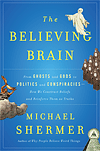 The Believing Brain
The Believing Brain
by Michael Shermer -
In this, his magnum opus synthesizing 30 years of research, Dr. Michael Shermer presents his comprehensive theory on how beliefs are born, formed, nourished, reinforced, challenged, changed, and extinguished. Essentially: beliefs come first, explanations for beliefs follow. We form our beliefs for a variety of subjective, personal, emotional, and psychological reasons in the context of environments created by family, friends, colleagues, culture, and society at large; after forming our beliefs we then defend, justify, and rationalize them with a host of intellectual reasons, cogent arguments, and rational explanations.
-
 Astrology: True or False?
Astrology: True or False?
by Roger Culver and Philip Lanna
-
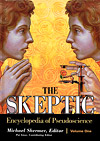 The Skeptic Encyclopedia of Pseudoscience
The Skeptic Encyclopedia of Pseudoscience
Michael Shermer, Pat Linse, Eds. -
Two volumes include and A–Z debunking of all things paranormal and pseudoscientific including case studies and in-depth analyses, a pro and con debate section, plus historical documents on many topics. This was published as a library reference book. Save over $50.00 off the price charged to libraries. GET THE SKEPTIC ENCYCLOPEDIA.
-
 Guidelines for Testing Psychic Claimants
Guidelines for Testing Psychic Claimants
by Richard Wiseman and Robert L. Morris -
Palm readers, astrologers and those who claim they can talk to the dead make the rounds of national talkshows. Even police departments enlist the services of “psychic” detectives. But what proof do we have that any of these claims are real? Richard Wiseman and Robbert Morris provide helpful and professional guidelines to help health professionals, law enforcement agencies, cult investigators, scientists, and the public at large assess those who make psychic claims. GET THE BOOK.
-
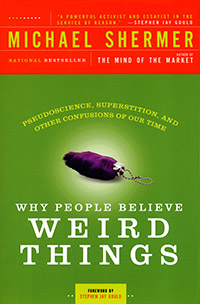 Why People Believe Weird Things
Why People Believe Weird Things
by Michael Shermer -
A no-holds-barred assault on popular superstitions and prejudices, this book debunks these nonsensical claims and explores the very human reasons people find otherworldly phenomena, conspiracy theories, and cults so appealing.
GET AN AUTOGRAPHED COPY OF THIS BOOK.

NEW ON SKEPTICBLOG.ORG
Rescuing People from Aliens
In this week’s Skepticblog, Daniel shares insights from Susan Clancy’s study of alien abductees, and asks what we can do to make skepticism a safe space for vulnerable people who need reliable information about paranormal topics.
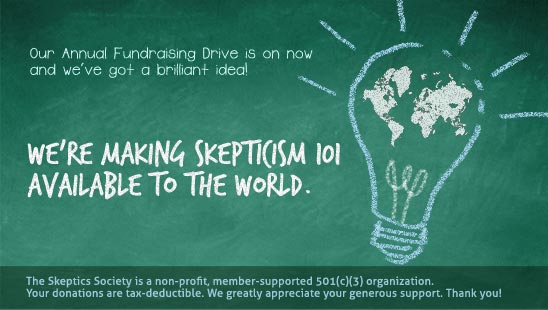
OUR ANNUAL FUNDRAISING DRIVE IS ON NOW
Help Send Skepticism 101 into the World!
- Click here to read our new plan to take Skepticism to the next level!
- Click here to make a donation now via our online store.
Monthly Recurring Donation Options Now Available
We encourage you to choose the monthly recurring donation option. Simply tell us how long you want your donation to recur (using the drop-down menu on the donation page) and we’ll set up automatic withdrawal for the amount you select.
Just for considering a donation, check out our free PDF download
created by Junior Skeptic Editor Daniel Loxton.












